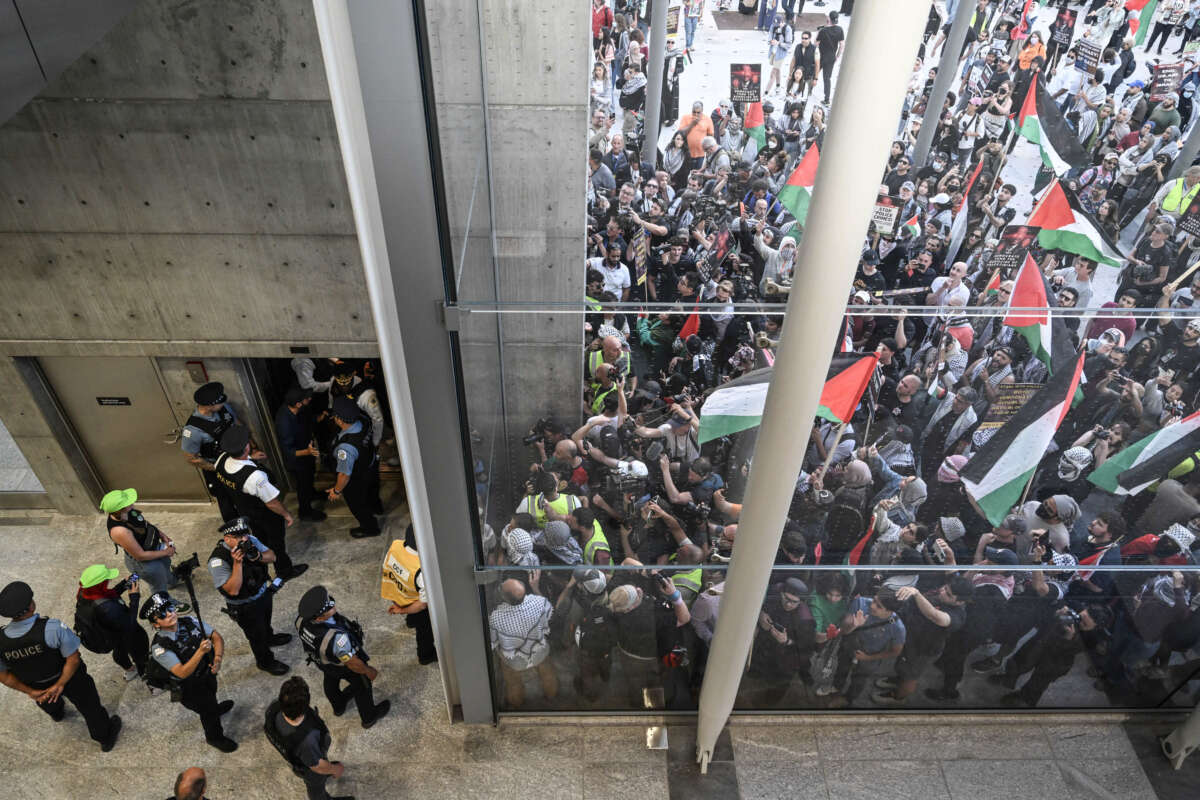Since the start of the week at the Democratic National Convention (DNC), pro-Palestinian voices, including the uncommitted delegates who have dedicated themselves to a ceasefire in Gaza and an arms embargo on Israel, have sought to have a Palestinian speaker included in the programming.
Early on Thursday morning, the leaders of that movement were told that wasn’t going to happen.
The decision came just hours after a Jewish American couple, Jon Polin and Rachel Goldberg-Polin, were given the opportunity to speak to delegates and the world on Wednesday night, pleading for the release of their son, 23-year-old American Hersch Goldberg-Polin, who was taken captive by Hamas back in October.
Since Hamas attacked Israel, the latter country has responded with a brutal military campaign that has killed a disproportionate number of Palestinians in an indiscriminate way. Officially, over 40,000 have been killed by Israel in Gaza, more than 40 percent of whom are children. The figure is likely much higher, given the number who are missing and how conditions in Gaza are resulting in starvation and other health situations that are causing deaths.
Before the announcement that no Palestinian speaker would be featured, the Uncommitted National Movement, posting on X, said that they were “strongly” supportive of letting Polin and Goldberg-Polin speak, but that they also hoped “that we will also be hearing from Palestinians who’ve endured the largest civilian death toll since 1948.”
“Excluding a Palestinian speaker betrays the party’s commitment in our platform to valuing Israelis and Palestinian lives equally,” the group added. “Vice President [Kamala] Harris must unite this party with a vision that fights for everyone, including Palestinians.”
During the DNC on Wednesday night, a sit-in was held outside the United Center, featuring a number of uncommitted delegates, who were joined by allies and interfaith leaders who also are calling for a speaker to be featured. The group was joined at one point by Rep. Ilhan Omar (D-Minnesota), who embraced Abbas Alawieh, an uncommitted delegate from Michigan and one of the movement’s leaders, as she joined them in the circle. Rep. Alexandria Ocasio-Cortez (D-New York) also called the demonstrators via FaceTime to express her support for their actions.
Representatives of the movement appeared on Zeteo’s “Mehdi Unfiltered,” with host Mehdi Hasan asking his guests what the latest news was on getting a pro-Palestinian speaker featured.
“We have asked the DNC to allow Palestinians elected to fulfill that role … elected within their own party, and we’ve just heard word that the answer is ‘no,'” co-chair of the Uncommitted Movement Layla Elabed said.
She detailed how frustrating the process has been, only to get a negative response from Democrats:
We thought we had been doing those negotiations for the last several days, we were being told ‘that’s a good thing,’ ‘there’s not a no answer, there’s not a yes answer,’ ‘keep giving us names.’ We have given them names of electeds, we have given them names of Palestinian Americans who have family in Gaza … all to come to this moment of like, no, it’s not going to happen.
Georgia State Representative Ruwa Romman noted that the DNC has featured other individuals — including anti-Trump Republicans — but wouldn’t even let Democratic lawmakers in support of Palestinians in Gaza speak.
“It is incredibly disappointing. … The whole point of any of this, it’s not about who is on that stage, it’s about being able to show there is room in the party for us, too,” Romman said.
“We have heard from Republicans this week, we have heard from so many different stakeholders. Our tent has become massive, including, by the way, Republicans from my state,” Romman added. “And, to think that those Republicans are allowed a bigger platform in my own party, than me as an elected official who, all I want to talk about is our story … instead, once again, we’re being told ‘no.'”
Despite the answer of “no” from the DNC, pro-Palestinian organizers kept the sit-in going, which they intend to continue until the Democratic Party agrees to let someone speak. Representatives for the DNC have offered to have a general meeting with them, but not to discuss whether a speaker will be allowed onstage, Zeteo reporter Prem Thakker said on X, documenting that several of the organizers slept on the sidewalk outside the United Center overnight.
Trump is silencing political dissent. We appeal for your support.
Progressive nonprofits are the latest target caught in Trump’s crosshairs. With the aim of eliminating political opposition, Trump and his sycophants are working to curb government funding, constrain private foundations, and even cut tax-exempt status from organizations he dislikes.
We’re concerned, because Truthout is not immune to such bad-faith attacks.
We can only resist Trump’s attacks by cultivating a strong base of support. The right-wing mediasphere is funded comfortably by billionaire owners and venture capitalist philanthropists. At Truthout, we have you.
Truthout has launched a fundraiser to raise $38,000 in the next 6 days. Please take a meaningful action in the fight against authoritarianism: make a one-time or monthly donation to Truthout. If you have the means, please dig deep.
